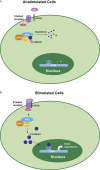Glycogen synthase kinase 3: more than a namesake
- PMID: 19366350
- PMCID: PMC2697722
- DOI: 10.1111/j.1476-5381.2008.00085.x
Glycogen synthase kinase 3: more than a namesake
Abstract
Glycogen synthase kinase 3 (GSK3), a constitutively acting multi-functional serine threonine kinase is involved in diverse physiological pathways ranging from metabolism, cell cycle, gene expression, development and oncogenesis to neuroprotection. These diverse multiple functions attributed to GSK3 can be explained by variety of substrates like glycogen synthase, tau protein and beta catenin that are phosphorylated leading to their inactivation. GSK3 has been implicated in various diseases such as diabetes, inflammation, cancer, Alzheimer's and bipolar disorder. GSK3 negatively regulates insulin-mediated glycogen synthesis and glucose homeostasis, and increased expression and activity of GSK3 has been reported in type II diabetics and obese animal models. Consequently, inhibitors of GSK3 have been demonstrated to have anti-diabetic effects in vitro and in animal models. However, inhibition of GSK3 poses a challenge as achieving selectivity of an over achieving kinase involved in various pathways with multiple substrates may lead to side effects and toxicity. The primary concern is developing inhibitors of GSK3 that are anti-diabetic but do not lead to up-regulation of oncogenes. The focus of this review is the recent advances and the challenges surrounding GSK3 as an anti-diabetic therapeutic target.
Figures


References
-
- Aguirre V, Werner ED, Giraud J, Lee YH, Shoelson SE, White MF. Phosphorylation of Ser307 in insulin receptor substrate-1 blocks interactions with the insulin receptor and inhibits insulin action. J Biol Chem. 2002;277:1531–1537. - PubMed
-
- van Amerongen R, Berns A. Re-evaluating the role of Frat in Wnt-signal transduction. Cell Cycle. 2005;4:1065–1072. - PubMed
-
- van Amerongen R, van der Gulden H, Bleeker F, Jonkers J, Berns A. Characterization and functional analysis of the murine Frat2 gene. J Biol Chem. 2004;279:26967–26974. - PubMed
-
- Asuni AA, Hooper C, Reynolds CH, Lovestone S, Anderton BH, Killick R. GSK3alpha exhibits beta-catenin and tau directed kinase activities that are modulated by Wnt. Eur J Neurosci. 2006;24:3387–3392. - PubMed
-
- Baggio LL, Drucker DJ. Therapeutic approaches to preserve islet mass in type 2 diabetes. Annu Rev Med. 2006;57:265–281. - PubMed
Publication types
MeSH terms
Substances
LinkOut - more resources
Full Text Sources
Other Literature Sources
Molecular Biology Databases

